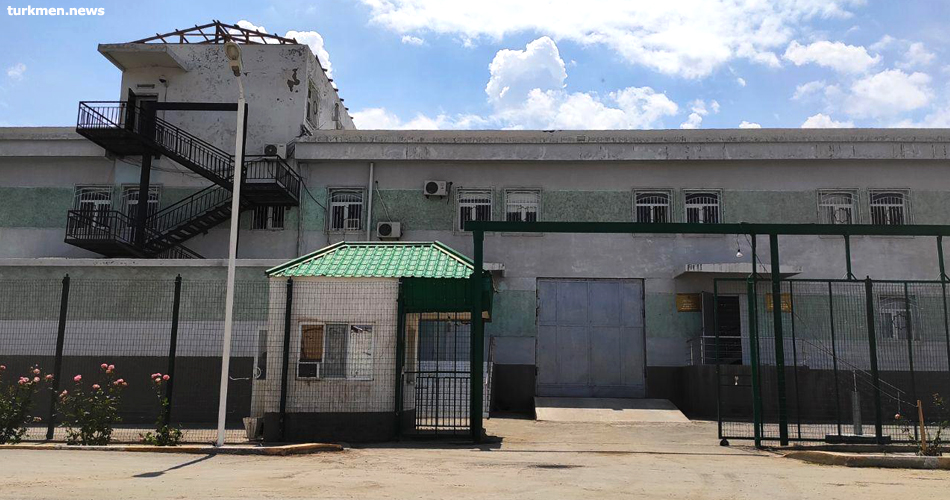
Sick Inmates Face Prospect of Cold Winter Sleeping in Turkmen Prison Yard
08.09.2023
The infamous Ashgabat police’s temporary detention facility, known as the Zhitnikov Street Cellars, has terrible associations for citizens across the country. Many people see a stay there as tantamount to a death sentence. Zhitnikov Street has been renamed Asudalyk Street, probably not by chance — “asudalyk” translates from Turkmen as “peace” or “calm.” Presumably the authorities wanted to dispel the terrible associations. But neither renaming the street, nor regular statements from officials about the absence of torture in Turkmenistan helps to quash the rumors. They are just that though — rumors: there’s practically no hard evidence about what happens on Zhitnikov Street. Whoever manages to get out of there and return to freedom is too broken to talk about what happened. But there are exceptions. One former inmate decided on condition of anonymity to write a review of his experience for turkmen.news.
***

I decided to write this piece after reading several articles where Turkmenistan’s leading diplomats try furiously to prove there is no corruption, torture, or extrajudicial punishment in the country. Having gone through all the dungeons in the Interior Ministry system, I feel compelled to contest those claims and describe in detail my experience in the Ashgabat city police’s so-called temporary detention facility (TDF) on Asudalyk Street, popularly known as the Zhitnikov Street Cellars.
I would like to make clear from the outset that I am a citizen of Turkmenistan. I do not have dual nationality and do not consider myself guilty of any of the crimes I was accused of, regardless of the verdict of Turkmenistan’s judicial system, and will give my reasons at the end of this article.
My arbitrary arrest took place around the end of April (I won’t give the year for reasons of safety). The weather was still relatively cool. I was placed in the TDF for the purposes of the investigation. People can be held in the temporary detention facility for no more than 72 hours (I first heard about this from one of my cellmates). After that, as someone under investigation (if the prosecutor approved an extension of my time in custody), I should have been transferred to the remand prison near the settlement of Yashlyk. No one observes these formalities in Turkmenistan though, just as no one observes the other rights of prisoners set out in the Criminal Procedure Code.
The TDF really is a medieval nightmare with some 20th century features. Especially if you remain there longer than 72 hours. The facility is located in the Interior Ministry’s three-story building slap bang in the center of Ashgabat next to the Gulistan Market (formerly the Russian Bazar), which the whole country knows. It’s within walking distance of the OSCE and UN offices.
The TDF has 19 cells — ten on the ground floor and nine on the first floor — that can hold from two to 16 people (that’s the number of supposed bunks). Sometimes more people are crammed into them than bunks, but fortunately I didn’t have to suffer that horror. It’s very cramped though, even with the allocated number of prisoners. I was in a cell for six people that was three meters wide, six meters deep, and around 4.5 meters high. There were three sets of double bunk beds fixed to the floor, six beds in all. There were no tables, chairs or other items in the cell. There was no ventilation or air conditioning system at all. The lighting was very dim, just one white bulb in a hole in the wall behind metal bars.
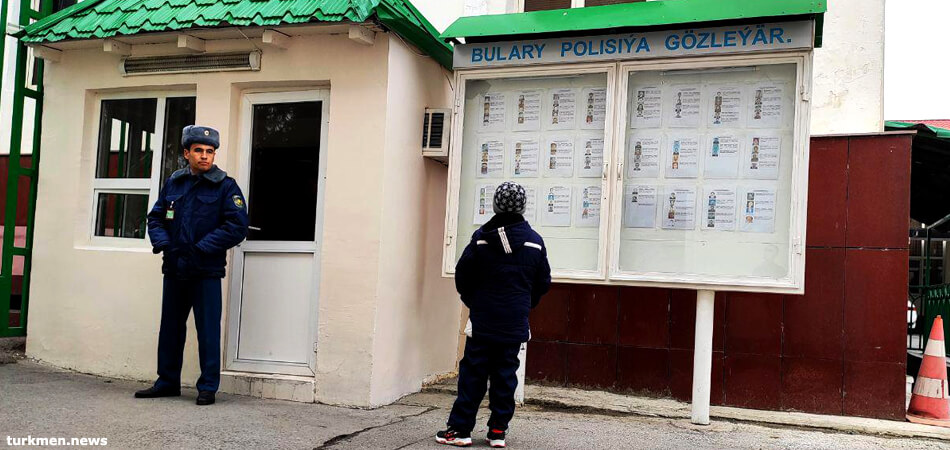
The worst cells are on the first floor. They are always cold in winter and hot in summer. It’s permanently damp and stale. The floors are all concrete. Their surface isn’t smooth, as they’re designed to be uncomfortable to walk or sit on. The whole floor is painted red.
The bunks are made of steel bars, roughly welded from different pieces of metal, and it’s impossible to lie on them. There are cells where the gap between the bars is very wide and as a result it’s torture trying to sleep at night. This really is torture and not carelessness. These cells have been created to torture detainees, not isolate them from the public.
The cells have a semblance of a window, which instead of glass has two bars and a steel sheet welded onto the outside so there’s no view out. It’s designed to create the sense of a closed prison, but it’s only a temporary detention facility for those under arrest, not for convicts.
To the left or right of the entrance is a concrete toilet, which has absorbed the urine of the hundreds of people who have passed through this hell hole, and a tin sink with a plastic pipe, which supplies only cold water at set times. Everything is horrendously dirty. The sink and toilet are not cleaned with any products or antiseptics. Detainees are not issued any bedding either.
So you’re shoved into a cell and a big black door with a food hatch is locked behind you. Most people probably imagine a cell full of hardened criminals with years of imprisonment behind them. But that’s not the case at all. The cell holds citizens just like you. First they ask about your age and life and only then do they ask why you’re in the cell. And they try to calm you down if you’re wound up and aggressive. Most of your cellmates confess to everything they’re accused of right away. But some do stand up for their rights and insist on their innocence till the end. There aren’t so many of them but they do exist.
The worst things about living conditions in the TDF are the lack of hot water, toothbrush and toothpaste, soap, and the impossibility of taking a shower or changing your clothes, not even your underwear. The most valuable thing your cellmates can offer you is an empty plastic bottle. You can’t manage without one: there’s no toilet paper and the water is turned off at 22.00. There’s a really bad stench in the cell with urine the strongest smell. After a few days’ stay a detainee feels all the delights of medieval life. Isn’t that encouragement enough to accept all the accusations just to get out of that hell? If you say “no,” you’re in for some sophisticated torture, of which more later.
Fortunately for me perhaps, corruption is highly developed in the TDF (as it is throughout the country.) It allows at least some improvement in the conditions of the detainees. If you appear to be a person of means, the head of the TDF himself (quite a well-educated man and pleasant to talk to) will receive you in his office with a cup of tea and offer you a range of options to relieve your time in custody.
You’re fed twice a day in the TDF like a dog, and pretty much the same food too. I could hardly swallow it. They give you plenty of bread, but it’s a dark grey color with high gluten content so you have serious heartburn if that’s all you eat. To my amazement, this bread does not go moldy. As well as bread they give you some kind of swill in a saucepan. Most have their own (disposable) plastic knives and forks and I also inherited a set that someone must have left behind. There are no cups, glasses, plates or any other crockery at all, not even disposable. So you learn that disposable tableware is precious and you will wash it carefully in cold water.
Cooked cabbage, pieces of potato and something resembling carrot float in the gloop in the saucepan. All six eat straight from the pan. There’s a second pan with porridge-like swill containing chaff. This is dinner! It is served after you have been taken out for a maximum of 30 minutes to walk in the yard at the side of the TDF. The yard is seven meters by 20 and is completely covered in concrete with even a concrete wall topped with wire netting. I felt like an animal in a zoo.
If anyone thinks that breakfast is more filling or appetizing, they’re wrong. There isn’t any at all. There is so-called brunch which is practically the same as dinner. On rare occasions you get barley grits. Over six weeks in the TDF I never once saw meat in any shape or form. All the food is brought in army billycans in the same vehicles that carry the detainees. I managed to find out that the food comes from military unit No. 1001. It must be the same food that the soldiers and guards eat. Believe me, when you’re hungry, you’ll even eat that. After they’ve eaten, the detainees wash the billycans themselves in the room next to the toilet on the ground floor where the cockroaches are too numerous to count.
After more than a week I was transferred to another cell, where some of my cellmates had already spent around a month. They were either detainees who refused to admit their guilt or who were being held at the request of the investigators in order to “build up” the case, as they say — to involve as many participants as possible. The guards told me that the record stay in the TDF is around eight months (though the legal limit is 72 hours, as I’ve said).
In a week I was already used to the pains in my back, legs, and arms from the uncomfortable bunks, and I also had problems with my vision. My eyes really hurt every time I went out into the yard. My cellmates said it was because of the bulb in the cell: it’s a cold white color and very dim. According to the law, there should be two exercise periods a day — in the morning and evening, but in reality we were taken out only once in the evening for 10 to 20 minutes.
Those who were held a long time in the TDF could at least receive some kind of parcel. This costs between 400 and 500 manats, depending on how agreement is reached and with whom. It can be done through the head of the TDF or one of the three duty heads. But your cellmates are also trying to survive and if you share a parcel with them, it will save you and your family a little money. Toothpaste and toothbrush top the wanted list. I never thought I would be so happy to have them, and soap too. It’s also possible to arrange with the guard to take a shower in the utility room where the inmates wash the billycans. This also costs money, but only your family can pay the bribe. It’s impossible to keep cash with you as it will simply be confiscated during the morning inspection and not be returned.
When the warmer weather comes you can wash during the exercise period in the concrete yard. A pipe with cold water is fixed up above the wire. The scenes of inmates bathing are reminiscent of films about prisoners in concentration camps. But at least it’s free.
After four weeks in the cells the guards begin to trust you enough to allow you to telephone your loved ones. This will cost from 200 manats for 20 minutes up to 500 manats for 30 minutes. You get the chance to call when everyone is out in the exercise yard. At this time you can be taken to an empty cell and given a telephone. My cellmates sometimes said they were ready to give up half their lives for the opportunity to call. I don’t understand why people have to be tormented with these restrictions, as they can just listen to the conversations to make sure the inmates don’t say anything they shouldn’t.
In four weeks I already knew all the different guards on shift and their bosses by name, and they all knew me well too. I could arrange to receive parcels from my family, was able to take a shower, and call my loved ones. But May was quite hot and a new affliction arrived: bedbugs. They ate everyone, literally. Arms and legs were covered in blood from the bites and scratching. Many people had no patch of skin untouched by scars and bite marks. While we managed to muddle along somehow with the cockroaches, even though they would crawl over our faces, we had to fight the bedbugs. I asked to be transferred to a cell on the first floor as I’d heard from one of the guards that it had been disinfected relatively recently. That might be why women were held on the first floor.
The cells on the first floor were large and held six or more people. This cell did have bedbugs, but noticeably fewer. They lead to the spread of various infections such as hepatitis and tuberculosis. The air conditioners didn’t work on the first floor either, as there was some kind of problem. The food hatches were left open to create at least some kind of circulation of air in the absence of windows. At the same time this allowed communication with other detainees. But if anyone behaved badly or started to insist on their rights, the duty guard would simply close the hatch and leave the detainees to swelter without ventilation or air conditioning. This is hell. You’re sitting in a steam room practically the whole day; the only relief is to wipe yourself with a towel soaked in cold water from the tap. Sometimes there’s a breeze from what passes for a window.
The TDF also has what are known as private cells for people who value cleanliness and privacy. It costs between 500 and 800 manats for 24 hours in one of these cells. But I didn’t see anything there that distinguished the cell from mine. Unless they were given a mattress and bed linen. Maybe they also had more access to modern comforts, but they had to pay for them too like everyone else. Corruption controls everyone and everything.
Though life itself in the TDF is torture, you are not tortured physically there. Unless you include women sometimes being intimidated to make them wash the floors in the corridors and young people being sent to clean the staff showers and toilet. Does this mean you’re not in danger? No, it’s just that prisoners are taken to another building to be tortured.
No one who should be observing procedures and the rights of detainees, at least in a rudimentary fashion, cares a dime about them. Regardless of who your defense lawyer is, they are just the investigator’s minion. They’re not your defender and it’s not worth relying on them.
The TDF has two rooms for interrogations. One is on the ground floor and the other on the first. You always have to be dressed for the interrogation in the same clothes you were arrested in, and no one cares if that was 30 days ago or 300, it’s the requirement. There’s no laundry in the TDF and no one is bothered about the state of your clothes; and yes, if you were arrested in summer and are questioned in winter, you have to wear those summer clothes.
The investigator can come for you whenever he wants and always without a lawyer. From the moment of your arrest you’re his personal domestic animal. You can refuse to talk to him without a lawyer present, but you’ll still be dragged out of the cell and thrown into the interrogation room. You can keep silent, but the investigator will still write a record of proceedings, “answering” the questions on your behalf. When and how you sign the record is another matter.
You’re told from the very beginning that the only way out of the TDF is through a trial and then only to a place of detention. There are no other options, even if you are as honest as the day is long and innocent of the crimes you are accused of. The investigator and your cellmates and the TDF staff will all tell you this. The number of not-guilty verdicts in the Turkmen legal system is zero. The investigators are well aware of this and will do what they want with you. The system in Turkmenistan ensures they will avoid any punishment for illegally bringing a criminal case and illegal deprivation of liberty. That’s why Turkmenistan ranks third in the world in terms of number of prisoners per head of population, not because we’re the most criminal nation.
No one visits from the OSCE or UN or from the Center for Preventive Diplomacy which has a special human rights officer. There’s no one to tell your story to. I’m going to disappoint those who think the president doesn’t know about this: he knows everything and won’t do anything even if you write to him and tell him your story in full. And your revelations won’t reach him anyway. We had naïve people who wrote to him from the cell. Believe me, your letters won’t even leave the TDF. Even if you give the letter to a lawyer, everything will be confiscated or he’ll give everything to the investigator himself.
As for torture… You won’t understand where they’re taking you — for investigative procedures or interrogation. Before being taken into the torture chamber, you’ll be allowed to meet one of your relatives who has supposedly been summoned for questioning. Then after 10 or 15 minutes of conversation it will look as though you’re going to be sent back to the TDF, but instead you’ll be taken to a room with a table, chair, and a piece of equipment that looks like a welding machine. Electric shock torture is the most widespread method, but if you have a weak heart or other health issues they’ll use water boarding or another type of horrific torture. The Interior Ministry officers who do this often smell of alcohol. Presumably they can’t do this kind of “work” sober.
If you take everything they throw at you, the next stage is to suggest you watch the member of your family, whom you saw just a few hours ago, going through the same thing: it might be your father or mother, your brother or sister or one of your grown children. This is how the investigative bodies of the Interior Ministry (and probably the National Security Ministry too) achieve a 100% confession rate during investigations before a case is submitted to court.
There are medical personnel in the TDF but they hardly have any medicines. One of the detainees was really unwell while I was there. He was dragged unconscious out of the cell like a piece of meat and put on the floor. The cell doors open only 45 degrees which made the operation more difficult. You can only walk out sideways.
The TDF was already unbearable after six weeks. When June arrived, I realized it would be very difficult to survive even with a strong heart. I lost a lot of weight which must have been the result of the diet and stress.
There’s only one way out: as a person under investigation demand a transfer from the TDF to the remand prison which in principle should happen 72 hours after your arrest. This is also decided by a bribe. It costs between 20,000 and 40,000 manats, which, taking into account all the other expenses at the TDF during this period, isn’t that much.
And now — the trip to the remand prison. The journey in an Interior Ministry Gazelle van took one and a half to two hours (though they said initially that I would be taken to the station and onwards by train). Somehow they managed to get 12 people into the van. There was no air conditioning and it was a tough trip during daytime in the scorching hot van. I was almost unconscious by the time we arrived. My shirt and trousers were soaked. But I was so relieved to have left the hellhole in the center of the capital that all the difficulties seemed trivial. I can only sympathize with those who remain there and have to stay for months in that hell.
***
The remand prison may really seem a safe place after the TDF. But as a whole the entire Turkmen detention system can be described as hellish. In 2022 several Iranian citizens spoke about their experience in Turkmen prisons. If you read their accounts, you will be convinced that the Zhitnikov Street cellars are the norm in Turkmenistan’s penitentiary system, rather than a shocking exception.

08.09.2023
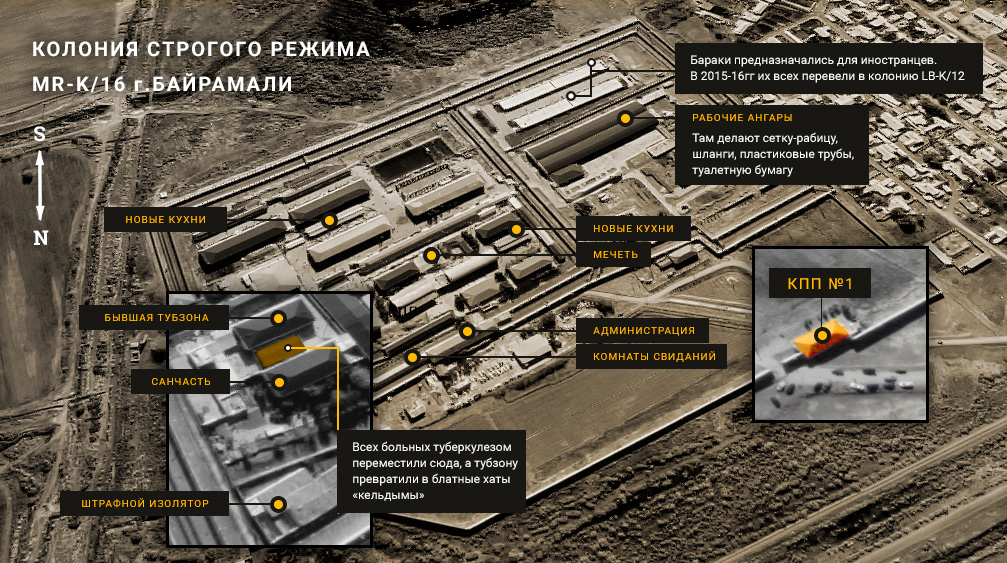
22.05.2019
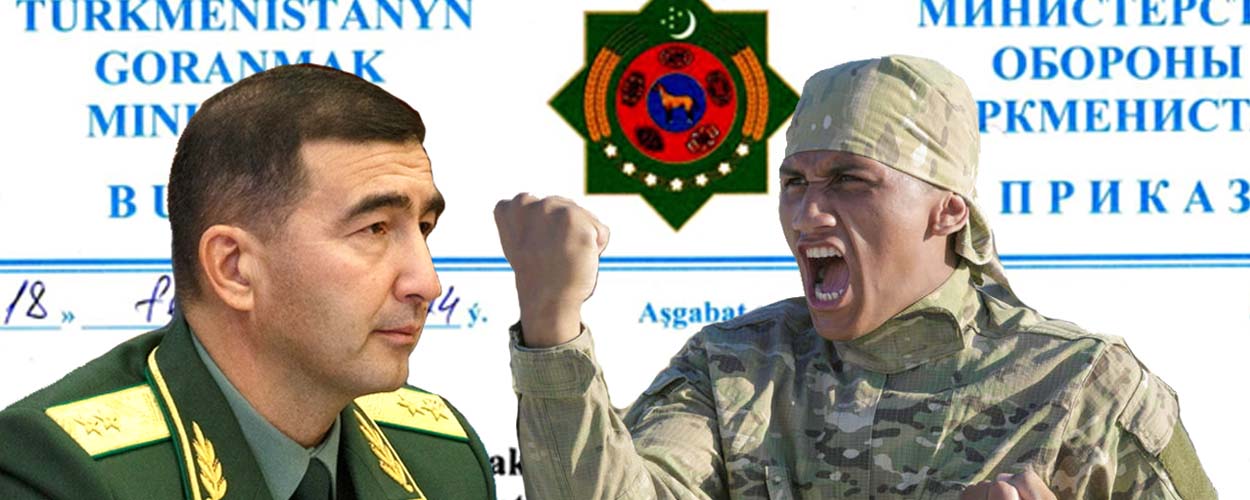
28.02.2024

Upmarket Bar in Ashgabat Closed After Brawls Involving President’s Cousins
08.04.2024

Petrofac Back in Favour in Turkmenistan After Falling Foul of Berdimuhamedov
18.03.2024

Turkmenistan’s Defense Minister Deprived Officers From Housing Entitlement Despite Widespread Resignations
28.02.2024

Murder and Suicide at Troubled Turkmen School
28.02.2024
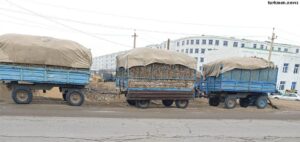
Low Prices Lead Turkmen Farmers to Sell Cotton Harvest Residues for Fodder
19.01.2024
Tell us!
We will be not surprised if OSCE & UN offices well known about it, and simply turn a blind eye to what is happening for bribes from the dictators. Double face Fuckers.